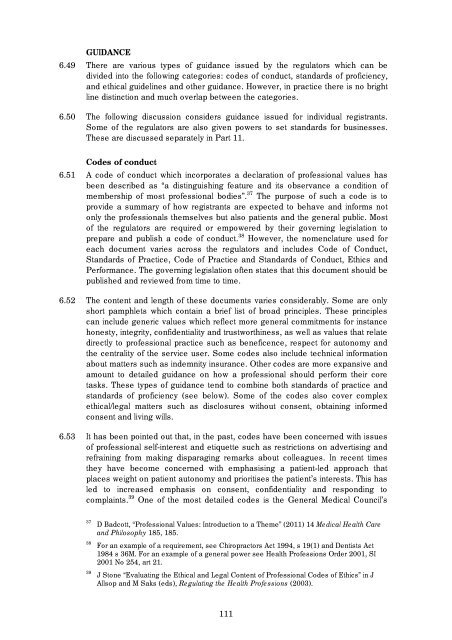Regulation of Health and Social Care Professionals Consultation
Regulation of Health and Social Care Professionals Consultation
Regulation of Health and Social Care Professionals Consultation
You also want an ePaper? Increase the reach of your titles
YUMPU automatically turns print PDFs into web optimized ePapers that Google loves.
GUIDANCE<br />
6.49 There are various types <strong>of</strong> guidance issued by the regulators which can be<br />
divided into the following categories: codes <strong>of</strong> conduct, st<strong>and</strong>ards <strong>of</strong> pr<strong>of</strong>iciency,<br />
<strong>and</strong> ethical guidelines <strong>and</strong> other guidance. However, in practice there is no bright<br />
line distinction <strong>and</strong> much overlap between the categories.<br />
6.50 The following discussion considers guidance issued for individual registrants.<br />
Some <strong>of</strong> the regulators are also given powers to set st<strong>and</strong>ards for businesses.<br />
These are discussed separately in Part 11.<br />
Codes <strong>of</strong> conduct<br />
6.51 A code <strong>of</strong> conduct which incorporates a declaration <strong>of</strong> pr<strong>of</strong>essional values has<br />
been described as “a distinguishing feature <strong>and</strong> its observance a condition <strong>of</strong><br />
membership <strong>of</strong> most pr<strong>of</strong>essional bodies”. 37 The purpose <strong>of</strong> such a code is to<br />
provide a summary <strong>of</strong> how registrants are expected to behave <strong>and</strong> informs not<br />
only the pr<strong>of</strong>essionals themselves but also patients <strong>and</strong> the general public. Most<br />
<strong>of</strong> the regulators are required or empowered by their governing legislation to<br />
prepare <strong>and</strong> publish a code <strong>of</strong> conduct. 38 However, the nomenclature used for<br />
each document varies across the regulators <strong>and</strong> includes Code <strong>of</strong> Conduct,<br />
St<strong>and</strong>ards <strong>of</strong> Practice, Code <strong>of</strong> Practice <strong>and</strong> St<strong>and</strong>ards <strong>of</strong> Conduct, Ethics <strong>and</strong><br />
Performance. The governing legislation <strong>of</strong>ten states that this document should be<br />
published <strong>and</strong> reviewed from time to time.<br />
6.52 The content <strong>and</strong> length <strong>of</strong> these documents varies considerably. Some are only<br />
short pamphlets which contain a brief list <strong>of</strong> broad principles. These principles<br />
can include generic values which reflect more general commitments for instance<br />
honesty, integrity, confidentiality <strong>and</strong> trustworthiness, as well as values that relate<br />
directly to pr<strong>of</strong>essional practice such as beneficence, respect for autonomy <strong>and</strong><br />
the centrality <strong>of</strong> the service user. Some codes also include technical information<br />
about matters such as indemnity insurance. Other codes are more expansive <strong>and</strong><br />
amount to detailed guidance on how a pr<strong>of</strong>essional should perform their core<br />
tasks. These types <strong>of</strong> guidance tend to combine both st<strong>and</strong>ards <strong>of</strong> practice <strong>and</strong><br />
st<strong>and</strong>ards <strong>of</strong> pr<strong>of</strong>iciency (see below). Some <strong>of</strong> the codes also cover complex<br />
ethical/legal matters such as disclosures without consent, obtaining informed<br />
consent <strong>and</strong> living wills.<br />
6.53 It has been pointed out that, in the past, codes have been concerned with issues<br />
<strong>of</strong> pr<strong>of</strong>essional self-interest <strong>and</strong> etiquette such as restrictions on advertising <strong>and</strong><br />
refraining from making disparaging remarks about colleagues. In recent times<br />
they have become concerned with emphasising a patient-led approach that<br />
places weight on patient autonomy <strong>and</strong> prioritises the patient’s interests. This has<br />
led to increased emphasis on consent, confidentiality <strong>and</strong> responding to<br />
complaints. 39 One <strong>of</strong> the most detailed codes is the General Medical Council’s<br />
37<br />
D Badcott, “Pr<strong>of</strong>essional Values: Introduction to a Theme” (2011) 14 Medical <strong>Health</strong> <strong>Care</strong><br />
<strong>and</strong> Philosophy 185, 185.<br />
38 For an example <strong>of</strong> a requirement, see Chiropractors Act 1994, s 19(1) <strong>and</strong> Dentists Act<br />
1984 s 36M. For an example <strong>of</strong> a general power see <strong>Health</strong> Pr<strong>of</strong>essions Order 2001, SI<br />
2001 No 254, art 21.<br />
39 J Stone “Evaluating the Ethical <strong>and</strong> Legal Content <strong>of</strong> Pr<strong>of</strong>essional Codes <strong>of</strong> Ethics” in J<br />
Allsop <strong>and</strong> M Saks (eds), Regulating the <strong>Health</strong> Pr<strong>of</strong>essions (2003).<br />
111
















